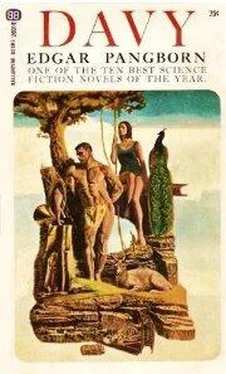It was a good commanding nose anyway, and useful to the gang because it told of his mood: so long as it stayed red or sunset pink there was nothing much to worry about, but if it went white while Pa was still sober, the wise thing to do was to keep out of sight and hope for the best, supposing you had anything on your conscience. His eyes were important signals too, small and black and restless. Just contrary to his nose, they went bloodshot when he was on the warpath — but of course if you were near enough to notice the swollen veins you wouldn’t benefit by running.
I never knew him to clobber anyone who hadn’t, according to Pa’s lights, earned it. Anyone who did received the quick tranquillizing sensation of a tall building falling on him, and when he dug himself out from under that, always amazingly undamaged, he could do as Pa said, God damn it, or quit. In all my time with Rumley’s no one left voluntarily until I did, and when I did it was no fault of Pa or myself: I left with his friendship and good wishes. If I could ever meet him again — idle remark, with all the sea between us and no prospect that any of us will ever turn again toward our native countries — it would be an occasion for affectionate talk and some long drinks. He’d be crowding seventy, now I think of it — and yet, he seemed so durable, it wouldn’t surprise me to learn that the gang is still Rumley’s Ramblers, still traveling somewhere and himself stifi the law and all the prophets.
He never got rough with the women, except for the loveroughness he must have provided when he took one as a partner for a night or a week or whatever length of time suited both. Now and then I’ve heard them wailing musically from the cubby-hole in his wagon — laughing the next instant or shouting wild talk with scant breath the way a woman won’t do unless she’s truly kindled. And I’ve seen them come out of there looking mighty rumpled, but never discontented.
Pa Rumley didn’t talk about his cot-work — those who do often haven’t done it of course — but some of the women did, to me no less, after I’d been with the gang a good while and developed a habit of listening, a thing almost unheard of in the teens. Minna Selig especially, three or four years older than I, was all hell on analyzing her feelings, for some odd time-passing fun she got out of it. I recall one occasion when she couldn’t rest until she’d stacked up my performance (her word) against Pa’s, detail by detail. I liked that quail, but that was one occasion when I wished she’d shut up — after all, I’d never claimed to be that good! Bonnie Sharpe could let in the daylight on Minna’s intellect with a poke or two, but I didn’t have the knack. When Bonnie wasn’t around, Minna would go after a joke or a light remark as if it were a school problem, and everything else must wait till she’d explained it back to you and sorted Out all its unreasonable aspects. I don’t mean she was grim, she just got her kicks out of it, some way; I think the sweet kid got as much pleasure out of such operations as a dumb creep like me gets out of laughing. It was Pa Rumley’s singleness of purpose, she explained, that made him better in bed than a boy — “ Not meaning for to hurt y’ feelings, Davy, it’s just something an older man learns, I guess. Pa’s like a rock, see, I mean even his face gets hard, smooth, cold almost, like he a n t hearing you no more at all, and you know you can do anything — holler, fight, struggle as much as you want, there’s no danger you’ll get away. Why, the wagon could catch afire and he wouldn’t stop till he’d have it, right there.” (I said: “You mean it’s like being screwed by a mountain?” She wasn’t listening.) “Now you, Davy, you be mostly too polite,” said that nice Rambler quail instructing an ex-yard-boy. “And this might surprise you but it’s a fact, Davy, a woman don’t like too much of that.” I says: “No?” “No,” she says — “in fact it might surprise you, but a woman don’t always mean exactly what she says — I know, it’s real surprising.” I said: “Sure enough?”
She said sure enough, and went on explaining it in the very friendliest way, I remember, while I said uhha and ayah and think-of-that-now — you know, being polite because it’s my nature — while we were hearing also the loud lazy screak of the wagon-wheels and the country sounds outside. I was seventeen at the time of that conversation, if my memory hasn’t goofed, and the countryside would have been the almost tropic splendor of southern Penn. It comes back to me with the musky sweetness of scuppernong grape in the air along with Minna’s fragrance, and I lying politely on her bunk with a leg slid conveniently under her hot and sweaty little bare brown tail, waiting (politely) until the never-hurrying wagon should provide just the right amount of jolt to swing us back into action. I knew Minna was right of course, and what she said doubtless had some effect, or I’d have heard other complaints about politeness later on, and I can’t recollect that I ever did.
Pa had never married. A Rambler boss seldom does. It’s traditional that he should remain available to soothe the restless, arbitrate quarrels, comfort the widow, instruct the young, and pacify all concerned by procedures not very convenient for a married man.
He was wondrous patient with the children, the small ones anyway; until they were seven or eight years old he scarcely tried to comb them out of his hair. There were seven when Sam and I arrived, a better showing than most gangs could make — seven children, twelve women, fifteen men, so Sam and I brought the gang total up to thirty-six. Three more children were born during my four years with Rumley’s. The oldest child was Nell Grafton’s boy Jack, ten when I first saw him; his father Rex Grafton had gone blind with cataracts near the time of Jack’s birth, and had taught himself harness-making, basketry, other skills. Jack was a handsome hellion born for trouble. Nell, that big sweet woman, mothered the whole gang and looked after her proud sharp husband in a way that sheltered his raw nerves and yet steered him away from selfpity, but her own wild boy she couldn’t control. Once or twice I tried to beat the cruel streak out of him, and that didn’t work either.
The bearing of Rambler children presents a continual problem to the Holy Murcan Church . How can the authorities be sure that all pregnancies are reported, no woman left alone after the fifth month, every birth attended by a priest, with a group that’s always on the go, in and out of the wilderness, over national boundaries without inspection, even excused from the taxes and other responsibilities that go along with settled residence and national citizenship? You’re right — they can’t. A Rambler is called — legally and with the consent of the Church because the Church can’t help it — a citizen of the world.
The Church has made sporadic efforts to take over the Ramblers, invariably catching its tail in the crack. Every now and then some enterprising prelate gives birth to an idea he thinks is new. The Archbishop of Conicut had a go at it in 318, not very long before we made a circuit of that country and then headed for southern Katskil and Penn. He decreed that every Rambler gang passing through Conicut must have a priest as one of its members. Simple, S’s he — how could they object, and why did nobody think of this before? ord got around before his law went into effect; when did, every gang had left Conicut. Outside each important border post — in Lomeda, and at Dambury in the south of Bershar, and Norrock which is Levannon’s only real southern port, and even away over at Mystic on the border of Rhode — a Rambler gang set up camp within sight of Conicut customs officers, with whom they fraternized agreeably enough, but for three months no Rambler gang set foot on Conicut soil, and no Rambler boss took the trouble to explain why.
Читать дальше












